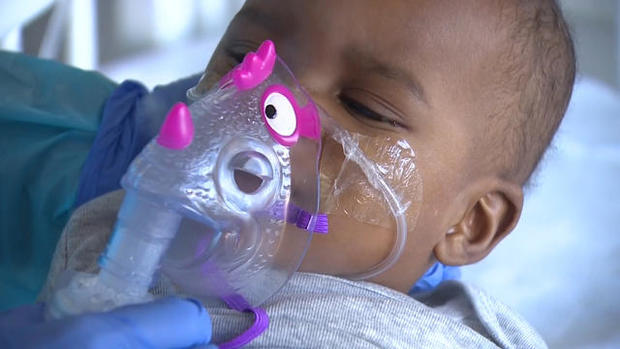The U.S. is being hit with one of the worst flu seasons in years, with 45 states reporting widespread illness, according to the Centers for Disease Control and Prevention — four times as many as this time last year. Experts warn that young children are particularly vulnerable.
Shareeka Smith’s 8-month-old son, Kingston, is a patient at Texans Children’s Hospital, fighting the flu.
“About four days ago he started breathing hard, vomiting, having fever,” she told CBS affiliate KHOU.
“The flu is very dangerous. It’s not your regular virus that gives you a couple days of runny nose,” said Dr. Claire Bocchini, an infectious disease specialist at Texas Children’s Hospital.

8-month-old Kingston was hospitalized with the flu in Houston.
KHOU-TV
CBS News medical contributor Dr. Tara Narula reports that the strain of flu that’s spreading this season, H3N2, tends to hit younger and older people harder than others.
“This is a bad bug,” said Dr. Daniel Jernigan, director of the CDC’s Influenza Division. “In years when there is H3N2, we do see that there are more deaths.”
Thirteen children across the U.S. have already died of the flu this season.
According to the CDC, children younger than 5 are at higher risk of developing serious flu-related complications — and babies under the age of 2, even more so.
“Their lungs, their immune systems are still developing, especially the younger ones, and so they have a lot more complications,” Bocchini explained.
The CDC estimates that since 2010, flu-related hospitalizations among children younger than 5 ranged from 7,000 to 26,000 a year in the U.S. Since the 2004-2005 flu season, between 37 and 171 children have died of the flu each year.
Adults age 65 and over are also at higher risk.
To help reduce the risk of catching or spreading the flu, health officials are encouraging frequent hand-washing throughout the day.
“Before snack time, before meal times, before and after potty,” Rachel Sherman, a teacher at the Jewish Council for Youth Services Early Childcare Center, told CBS Chicago.
“We were hit last month quite badly actually,” she continued. “[The flu] took out a few of our classes and even teachers.”
CBS Chicago reports that a 10-year-old boy in the area died of the flu on New Year’s Eve after the virus attacked his heart.
“We’ve seen 675 cases of the flu over the last two weeks,” Dr. Stephen Epner of Physicians Immediate Care told the station. At all 31 Physicians Immediate Care locations, doctors are seeing a 20 percent spike in patients.
“It seems like it’s about 30 to 50 percent worse than the previous 2 to 3 years,” Epner said.
Across the country, it’s a similar situation. Making matters worse, there’s an ongoing shortage of IV bags – produced in factories in storm-ravaged Puerto Rico – which are needed to deliver medicine and treat dehydrated patients at hospitals.
In California, flu-related deaths are particularly high. Officials have reported 27 flu-related deaths among Californians under age 65. The state typically sees three or four such deaths by this time in the season, officials said.
The single best way to protect children and adults from the flu is to get a flu shot. According to the CDC, everyone 6 months of age and older should get a seasonal flu vaccine each year. And even though the flu season is already underway, it’s not too late to get the shot.
“Right now the CDC is estimating that the vaccine effectiveness is at about 32 percent. While it’s not 100 percent it is still effective for a significant proportion of the population,” said Dr. Jennifer Layden, chief medical officer at the Illiniois Department of Public Health.
“Even if you get the flu, with a vaccine, it’s more mild, you’re less likely to go to the hospital and you’re contagious for a less amount of time. It’s not too late to get the vaccine for this season,” Layden said.
The CDC also recommends the following tips to keep you and your family safe from the flu:
- Try to avoid close contact with sick people.
- While sick, limit contact with others as much as possible.
- If you are sick with flu-like illness, stay home for at least 24 hours after your fever is gone except to get medical care or for other necessities.
- Cover your nose and mouth with a tissue when you cough or sneeze. Throw the tissue in the trash after you use it.
- Wash your hands often with soap and water. If soap and water are not available, use an alcohol-based hand rub.
- Avoid touching your eyes, nose and mouth. Germs spread this way.
- Clean and disinfect surfaces and objects that may be contaminated with germs like the flu.

